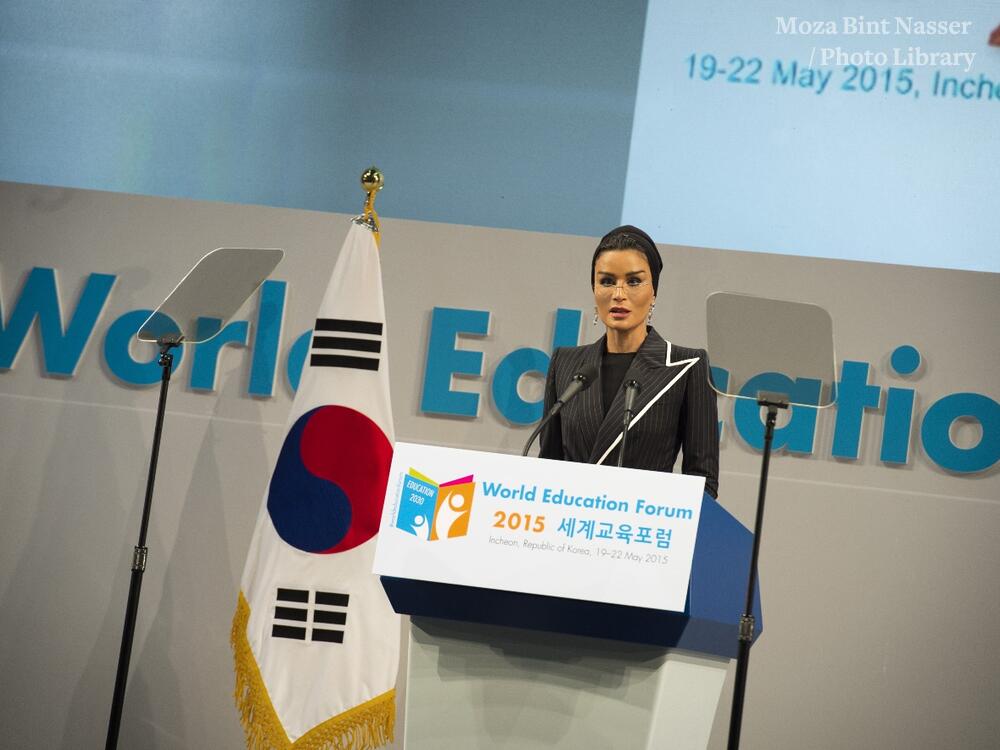CPO Content Area

HH Sheikha Moza at the World Education Forum 2015 and the 6th Asian Leadership Conference in Korea
Her Highness Sheikha Moza bint Nasser, Chairperson of Education Above All (EAA), gave a keynote speech at the 6th Asian Leadership Conference, seeking to forge new alliances between the education and business communities. Her Highness called upon socially responsible corporations and philanthropic leaders to support the cause of quality universal primary education, challenging the notion that primary education is only the responsibility of governments.
Her Highness appealed to major corporates and business leaders to bring their expertise and resources to the global education crisis: “In 2000, the world made a promise that by 2015 all children would have access to quality primary education. Yet we still have 58 million children out of school who need help. I am worried that governments alone cannot solve this problem.”
Speaking of the Educate A Child programme she founded in 2012, she said: “Our approach is succeeding. Since the program began, we and our partners, have made commitments to offer opportunities to 5 million children. We have agreements with development agencies and private sector organisations across the world. We are advocating placing primary education as the first priority in global giving campaigns…But we alone cannot reach the millions more children who deserve this chance. To reach our goals, we need like-minded partners, we need expertise, and we need more financial resources.”
Her Highness praised the Republic of Korea for its model of private and public investment in education and its success in economic and social transformation. Korea is the world’s second biggest per capita spender on education; the Korean government allocates almost 8% of its GDP to education. Her Highness commended Korea’s transformation from donor recipient to Development Assistance Committee member, being at the forefront of development policy.
Opening remarks were made by Bang Sang-Hoon, the President and CEO of The Chosunilbo, followed by UN Secretary General, Ban Ki-moon with congratulatory remarks from the President of South Korea Park Geun-hye. Indian Prime Minister Narendra Modi also spoke at the opening.
Her Highness also spoke today at the opening ceremony of the World Education Forum 2015 (WEF) in Incheon, South Korea, where the achievements of the education-related Millennium Development Goals are being assessed and a new education agenda is being prepared for 2015 to 2030.
Her Highness urged the global community to seize the once in a generation opportunity to support millions of disadvantaged out of school children into quality primary education.
“The education 2030 agenda carries some ‘unfinished business’ that needs to be addressed. Millions of out of school children have not been served by the past agenda only half of all countries have achieved universal primary enrolment and 58 million primary aged children are out of school”.
Her Highness stressed that universal primary education must be prioritised to ensure that millions of children will not be forgotten again.
“Let us renew our national commitments by implementing funding mechanisms that channel funds to primary education first.”
Her Highness also emphasised the need for the quality of education. “Let us always evaluate our achievements through the lens of quality and never ever accept that 250 million children leave primary school without knowing how to read and write…. We must not give up because the task is tedious and dangerous,” she commented.
Her Highness concluded; “Today in Incheon, we have a once in a generation opportunity to focus governments, galvanize donors and attract new investors. So let us prove that the international community is indeed committed to ensuring quality primary education. Let us ensure that this declaration is not just another declaration. Let us be the generation to be remembered.”
The future education 2030 agenda will encapsulate Goal 4 of the Sustainable Development Goals (SDGs) that will succeed the Millennium Development Goals (MDGs) including MDG2, which aimed to achieve universal primary education by 2015. The Framework for Action, targeted towards an ambitious goal to ensure inclusive, equitable and lifelong education opportunities for all will be adopted in a special high-level meeting alongside the 38th session of the General Conference of UNESCO in November 2015.
Other speakers at the opening ceremony included South Korean President, Park Geun-hye; UN Secretary-General Ban Ki-moon; Director-General of UNESCO, Irina Bokova; President of the World Bank Jim Yong Kim; and the co-winner of the 2014 Nobel Peace Prize, Kailash Satyarthi.

